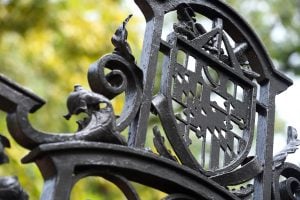
Aurik Sarker will be graduating with a master’s degree in electrical engineering. He is originally from Anaheim, California.
How did you get interested in electrical and computer engineering? What interests you the most about the field?
I chose Electrical Engineering originally because of my experience on VEX and FRC robotics teams during high school, where one of my primary tasks was managing electrical connections on the robot. So I came to JHU with the intention of learning more about robotics and analog circuitry. However, after just a couple years here I learned that Electrical Engineering actually encompasses many different fields, from applied optics to signal processing to controls theory. Honestly, all of these fields were super interesting to me, and I especially enjoyed seeing how different areas of study come together to make large-scale and complex systems work.
What made you decide to come to Johns Hopkins?
Having lived in California for most of my life, I knew I wanted to go to college on the east coast, and JHU ended up being one of the schools I got accepted to on this side of the country. I liked that Hopkins was located quite close to many other cities, like DC, Philadelphia, and New York City, and appreciated its comparatively small class sizes. In the end, Hopkins’ generous financial aid package was the catalyst that made me select it as my destination for undergrad.
What research were you involved in during your time in ECE? What was your role?
My first research experience was in a lab in the ChemBE department performing image processing over many frames of cells and colloids. For this project, I was given a lot of free reign to explore different techniques and solve the given problem on my own; this really fostered my interest in research and solidified my desire to go to grad school. Another research project I worked on was developing simulations to prevent voltage collapse in power networks, with fellow ECE student Jesse Rines under the supervision of Dr Enrique Mallada. This two-year project helped further my academic career by allowing me to work with a research group and publish to a conference.
What impact do you hope to make through your research?
The very nature of research is solving open problems, and that’s kind of the impact that I want to have: being the one that works on problems which may not even have a solution. Even if you can’t solve it, the techniques developed along the way may actually find an application elsewhere.
Outside of lab and class: were you involved with (groups, organizations, intramurals, etc.)?
I played cello for the Hopkins Chamber Orchestra and was a brother in Theta Tau all four years here. I am also currently the president of our JHU chapter of the IEEE. Additionally, I tutored at 901 Arts center during my freshman and sophomore years.
What sort of impact do you hope to have either as an engineer or in a STEM field?
One fascinating thing about research is the vast expanse of knowledge out there which has not found a practical application yet. If I am working in industry, I would love to be the one who can find an unexplored solution to a real-life problem by reading papers and collaborating with other researchers.
What are your plans or goals after graduation?
My immediate plans are to work full time at the Applied Physics Laboratory in Columbia, MD. However, my goal is to apply to PhD programs in signal processing and attend graduate school after a year or two of working. My ultimate goal is to become a professor at some point after that, but I will most likely work R&D at a company after graduating.